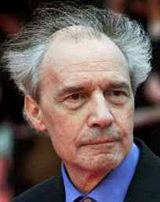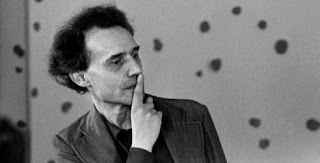 R.I.P Jacques Rivette ( March 1928- 29 January 2016). Very sad news : the incomparable Jacques Rivette , one of the founding cornerstones of the French New Wave and Cahiers du Cinema, has left us. As a film director and film critic Rivettte, indeed as one of the more experimental pioneers of post-war French cinema, lived a life exclusively dedicated to the creation, watching and criticism of cinema. To his dear friends, peers, and contemporaries Rivette's life was quite enigmatic, private and solely dedicated to cinema. It's without any sense of exaggeration to say that Rivette's sublime art and life was Mallarmean in its overriding character is not to stretch our proverbial long bow here. Rivette's oeuvre of 28 films was one that in comparison with others of his time was not exactly large but it was an oeuvre that cinema's future possibilities spoke to us in such enduring, poetic, rapturous and fictional terms. To see a Rivette film for the first time is akin to watching the birth of cinema itself. Such were the protean transcendental capabilities of Rivette as an auteur who always experimented, improvised, often started with a few loose outlines or notes rather than an elaborate script as such, shaping his works as loose narratives of exceptional long running times and full of improvisatory 'zig-zag' creativity with his actors, locales, sets, etc. To fracture Mallarme's famous quote about the world as an eternal book - "Everything in this world exists in order to end up as a book " - Rivette made his fantastic labyrinthian, paranoid, open-ended, conspiratorial, and theatrical films of magical everydayness in the light of Mallarme's cardinal belief. But importantly Rivette's cinema was a highly unique amalgam of the geometric fatalism of the crime films of Louis Feuillade and Fritz Lang and the discursive free ranging characters of Jean Renoir and Howard Hawks.
R.I.P Jacques Rivette ( March 1928- 29 January 2016). Very sad news : the incomparable Jacques Rivette , one of the founding cornerstones of the French New Wave and Cahiers du Cinema, has left us. As a film director and film critic Rivettte, indeed as one of the more experimental pioneers of post-war French cinema, lived a life exclusively dedicated to the creation, watching and criticism of cinema. To his dear friends, peers, and contemporaries Rivette's life was quite enigmatic, private and solely dedicated to cinema. It's without any sense of exaggeration to say that Rivette's sublime art and life was Mallarmean in its overriding character is not to stretch our proverbial long bow here. Rivette's oeuvre of 28 films was one that in comparison with others of his time was not exactly large but it was an oeuvre that cinema's future possibilities spoke to us in such enduring, poetic, rapturous and fictional terms. To see a Rivette film for the first time is akin to watching the birth of cinema itself. Such were the protean transcendental capabilities of Rivette as an auteur who always experimented, improvised, often started with a few loose outlines or notes rather than an elaborate script as such, shaping his works as loose narratives of exceptional long running times and full of improvisatory 'zig-zag' creativity with his actors, locales, sets, etc. To fracture Mallarme's famous quote about the world as an eternal book - "Everything in this world exists in order to end up as a book " - Rivette made his fantastic labyrinthian, paranoid, open-ended, conspiratorial, and theatrical films of magical everydayness in the light of Mallarme's cardinal belief. But importantly Rivette's cinema was a highly unique amalgam of the geometric fatalism of the crime films of Louis Feuillade and Fritz Lang and the discursive free ranging characters of Jean Renoir and Howard Hawks. Amongst the Cahiers du Cinema critics Rivette was one of the more significant perceptive commentators on cinema especially on American genre cinema with filmmakers like Alfred Hitchcock, John Ford, Otto Preminger and Nicholas Ray, among others. He was, like Truffaut and others, highly critical of mainstream French cinema and his critical pieces were, on the whole, among the more deftly and perceptively crafted contributions to the journal. Who cannot forget reading Rivette's eloquent, knowing and horizontal-expanding film criticism for the first time yet alone being rapturously embraced by the sheer dancing materiality of his lyrical enduring films ? We watched his beautiful elaborate improvised films with the dawning seductive conviction that not only Paris belonged to us but his films did as well. I am saddened by Rivette's passing at 86 years old but we who are still living have his captivating films to watch and not just among ourselves. They will survive for future eyes and hearts to see and feel.
In the sixties when I first encountered Rivette's oeuvre here in Sydney then in London, New York and Paris later in the 70s, aside from the obligatory film journals like Sight and Sound, Film Comment, and Monthly Film Bulletin, among many others, one should single out Jonathan Rosenbaum for championing his work back then not only in his important journal articles but also in his influential 1977 book "Rivette : Texts and Interviews." The other critic that comes to mind on Rivette was the enthusiastic John Hughes who wrote a few delirious cinephlliac pieces - if memory serves me correctly - in Film Comment. Perhaps in the coming week I may post a further piece on Rivette - the films that mattered for me over the years - till then dear readers reach out for Rivette's cinema and criticism : both are enchantments that will endure for us all.
 |
| Celine and Julie Go Boating |

No comments:
Post a Comment
Note: only a member of this blog may post a comment.